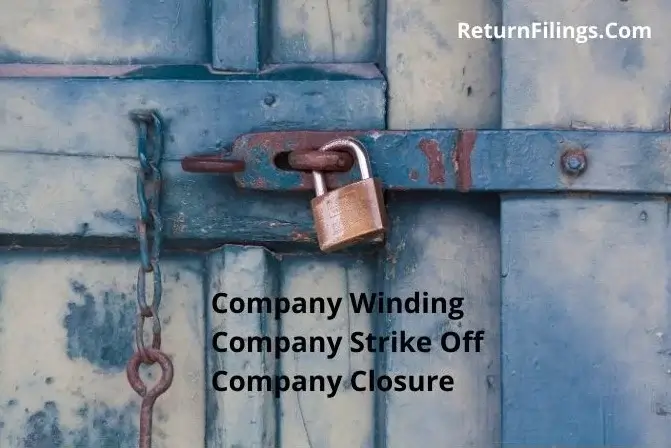Closure of Company in India: Methods, Stepwise Process & Legal Considerations
1. Introduction
A company incorporated under the Companies Act, 2013, and registered with the Registrar of Companies (ROC) must comply with the provisions of the Act and relevant rules. However, due to various circumstances, a company may need to be closed. The closure of company can be either voluntary or through a court order.
2. Common Circumstances Leading to Closure of company
2.1 Inability to Commence Business
• A company may be incorporated but fail to commence operations within one year.
• Such conditions may voluntarily opt for closure of company after remaining inactive.
2.2 Fulfillment of Business Objective
• Some companies are established for a specific project or objective.
• Once the objective is achieved, there may be no need to continue operations, thus final closure of company will take place.
2.3 Financial Losses and Non-viability
• Suffering persistent losses may opt for closure of company due to lack of profitability.
• If the business model is no longer sustainable, winding up becomes a viable option.
2.4 Death of Promoters or Directors
• If key promoters or directors pass away and the remaining members do not wish to continue the business, closure of company may be the next step.
2.5 Insolvency and Inability to Repay Debt
• Companies unable to repay debts may undergo compulsory winding up under insolvency laws.
2.6 Non-Compliance and Regulatory Consequences
• Companies failing to comply with legal requirements face penalties, including inactive status, director disqualification, and forced strike-off by the ROC.
2.7 Fraudulent or Illegal Activities
• If a company is found guilty of fraudulent practices or misconduct, regulatory authorities may order its closure.
3. Methods of Closure of company
3.1 Voluntary Winding Up
Companies can voluntarily wind up by passing a special resolution. The two main options include:
Fast Track Exit (FTE)
• Companies with no assets or liabilities can file for closure via the FTE process.
• Required documents include audited financial statements and an income tax return.
• Directors must declare that the company has no outstanding creditors or debts.
• Closure forms must be filed on the MCA Portal.
Dormant Company Status
• Companies not engaged in business can apply for “Dormant” status instead of winding up.
• Benefits include exemption from annual filings and compliance burdens.
• The company can be reactivated later by filing necessary forms with the ROC.
• The Company will retain the name of company registered and later whenever required may apply for active status.
3.2 Compulsory Winding Up by Court or Tribunal
The National Company Law Tribunal (NCLT) may order the closure of a company in cases such as:
• The company acts against the sovereignty and integrity of India.
• The company is unable to pay debts and is declared insolvent.
• The business is conducted fraudulently or mismanaged.
• The company has defaulted in filing financial statements or annual returns for a specified period.
4. Step-by-Step Procedure for Closure of company
4.1 Voluntary Winding Up Process
a. Board Meeting:
Convene a board meeting to pass a resolution for voluntary winding up.
b. Shareholders’ Approval:
Pass a special resolution in the general meeting.
c. Declaration of Solvency:
Directors must sign and submit a declaration that the company has no outstanding debts.
d. Application to ROC:
File required forms such as MGT-14 and STK-2 with the Registrar of Companies.
e. Publication of Notice:
Notify creditors and the public about the winding-up decision.
f. Final Approval:
ROC reviews and, upon satisfaction, removes the company’s name from the register.
4.2 Tribunal-Ordered Winding Up Process
a. Petition Filing:
A petition is filed before the NCLT by creditors, the company, or regulators.
b. Tribunal Inquiry:
The NCLT examines the case and issues a winding-up order if justified.
c. Appointment of Liquidator:
A liquidator is appointed to oversee asset liquidation and debt repayment.
d. Dissolution Order:
Upon completion of proceedings, the NCLT orders dissolution and the company ceases to exist.
5. Key Considerations Before Closure of Company
• Ensure that all statutory dues, employee salaries, and liabilities are cleared.
• File all pending income tax returns and ROC compliances.
• Notify stakeholders and creditors before initiating the closure process.
• Maintain necessary records for a few years post-closure as per legal requirements.
6. Conclusion
Closure of company is a structured legal process that requires careful consideration of compliance requirements. Depending on the circumstances, companies can opt for voluntary closure or be subject to tribunal-ordered winding up. It is crucial to follow the prescribed procedures to ensure a smooth and hassle-free closure.
By adhering to the above compliance requirements, avoid penalties, and maintain good legal standing. For professional assistance, reach out to us on email: info@returnfilings.com or on whatsapp: https://wa.me/919910123091 to ensure all statutory obligations are met on time.
frequently asked questions (faq's) related to Winding Up OR Closure of Company
Q What is the difference between "closure" and "winding up" of a company?+
A
While often used interchangeably, there are distinctions:
Closure (Striking Off): A simpler, faster process for defunct companies that haven't carried on any business or operations for a certain period or have failed to commence business within a year of incorporation. The company's name is simply struck off the register.
Winding Up: A more formal and complex process for solvent or insolvent companies, involving the liquidation of assets, payment of liabilities, and eventual dissolution of the company.
Winding up generally involves a liquidator and is overseen by the National Company Law Tribunal (NCLT), while closure (striking off) is handled by the Registrar of Companies (ROC).
Q Why would a company be closed or wound up?+
A
Reasons for closure or winding up include:
• Business failure or lack of profitability.
• Completion of a specific project or objective.
• Merger or acquisition with another company.
• Shareholder disputes or disagreements.
• Non-compliance with legal requirements.
Q When can a company be closed through the striking-off process?+
A
A company can be struck off if it:
• Has failed to commence its business within one year of its incorporation.
• Has not carried on any business or operation for two immediately preceding financial years and has not made any application within such period for obtaining dormant status under section 455.
• The subscribers to the memorandum have not paid the subscription amount and the declaration to this effect has not been filed within 180 days of its incorporation.
• The company has failed to obtain a commencement of business certificate within one year of its incorporation.
• The directors have not made any declaration within 180 days of its incorporation that every subscriber to the memorandum has paid the value of shares agreed to be taken by him.
Q What is the process for closing a company through striking off?+
A
The process generally involves:
• Passing a resolution for striking off at a board meeting.
• Filing an application with the Registrar of Companies (ROC) in Form STK-2.
• Submitting the required documents and paying the prescribed fees.
• The ROC verifies the application and, if approved, strikes the company's name off the register.
Q What documents are required for striking off a company?+
A
Documents typically include:
• Application in Form STK-2.
• Board resolution.
• Affidavit from directors.
• No Objection Certificate (NOC) from relevant authorities (if required).
• Auditor's certificate.
Q What are the different types of winding up?+
A
There are two main types of winding up:
• Voluntary Winding Up: Initiated by the company itself through a special resolution.
• Compulsory Winding Up: Ordered by the National Company Law Tribunal (NCLT) on a petition filed by creditors, contributories, or other parties.
Q What is the process for voluntary winding up?+
A
The process generally involves:
• Passing a special resolution for winding up at a shareholders' meeting.
• Appointing a liquidator.
• Liquidating the company's assets.
• Paying off creditors.
• Distributing any remaining funds to shareholders.
• Filing the final return with the ROC for dissolution.
Q What is the process for compulsory winding up?+
A
The process generally involves:
• Filing a petition with the NCLT.
• The NCLT hearing the petition and, if deemed fit, ordering the winding up.
• Appointing a liquidator (often an official liquidator).
• Liquidating the company's assets.
• Paying off creditors.
• Distributing any remaining funds to shareholders.
• The NCLT passing an order for dissolution.
Q What are the grounds for compulsory winding up?+
A
Grounds for compulsory winding up include:
• Inability to pay debts.
• Default in filing annual returns or financial statements.
• Oppression of minority shareholders.
• Where the company has acted against the interest of the State or general public.
• Just and equitable grounds.
Q What are the fees for closing or winding up a company?+
A Fees are prescribed by the MCA and the NCLT and are subject to change.
Q How long does the closure or winding up process take?+
A The process can take several months to years, depending on the complexity of the case.
Q What happens to the company's assets and liabilities after dissolution?+
A After dissolution, the company ceases to exist legally, and its assets and liabilities are dealt with as per the winding-up process.
Q What are the implications for directors and shareholders after the company is closed or wound up?+
A Directors' powers cease, and they may have certain liabilities. Shareholders receive any remaining assets after creditors are paid.
Q How do I find out if a company is being wound up?+
A You can check the status of a company on the MCA website.
Q What is the role of a liquidator in the winding-up process?+
A The liquidator manages the company's assets, pays off creditors, and distributes remaining funds to shareholders.
Q What happens to the company's bank accounts after it is wound up?+
A The bank accounts are usually frozen and dealt with by the liquidator.
Q What are the tax implications of closing or winding up a company?+
A Consult a tax professional for specific advice or reach out to us on email: info@returnfilings.com or on whatsapp: https://wa.me/919910123091.
Q How can I avoid my company being wound up?+
A Ensure timely compliance with all legal requirements and manage the business effectively.
Q What are the consequences of not complying with the winding-up process?+
A Non-compliance can lead to penalties and legal issues.
Q Can a company be revived after it has been wound up?+
A Revival after final dissolution is generally not possible.
Q What is the difference between a members' voluntary winding up and a creditors' voluntary winding up?+
A Members' voluntary winding up is for solvent companies, while creditors' voluntary winding up is for insolvent companies.
Q What is the role of the NCLT in the winding-up process?+
A The NCLT oversees the winding-up process and passes orders related to it.
Q Where can I find legal advice regarding the closure or winding up of a company?+
A You should consult with any professional specializing in corporate law or reach out to us on email: info@returnfilings.com or on whatsapp: https://wa.me/919910123091.
- For further reading, explore the following topics:
- 🤝 Shareholders Agreement in India: Essential Legal Aspects & Compliance Steps for Businesses
- 📜 How to Avail GST Amnesty Scheme in India: Latest Updates, Benefits & Filing Requirements
- 🔧 Amending a Partnership Deed in India: Legal Steps, Compliance & Real-World Examples
- 📅 Step-by-Step Guide to OPC Annual Filing Requirements Under Companies Act, 2013

